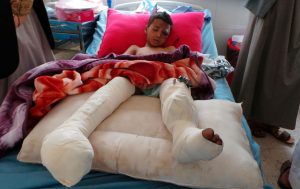MOHAMAD BAZZI, mohamad.bazzi at nyu.edu, @BazziNYU
Available for a limited number of interviews, Bazzi is a journalism professor at New York University and a former Middle East bureau chief at Newsday. He is writing a book on the proxy wars between Saudi Arabia and Iran.
He just just wrote the piece “American Officials Could Be Prosecuted for War Crimes in Yemen” for The Nation and “Congress Is Forcing a Confrontation With Saudi Arabia” for The Atlantic.
Trump just announced that he is sending Secretary of State Mike Pompeo to Saudi Arabia.
Bazzi notes that just last month Pompeo certified to Congress that Saudi Arabia and the United Arab Emirates “were trying to minimize civilian casualties and to enable deliveries of humanitarian aid. … But the administration’s assurances contradicted virtually every other independent review of the war, including the recent report by a group of UN experts and several Human Rights Watch investigations that found the Saudi coalition culpable of war crimes.
“On September 20, The Wall Street Journal reported that Pompeo decided to certify Saudi and Emirati compliance over the objections of many State Department officials. The Journal quoted a classified memo in which most of the agency’s regional and military experts urged Pompeo to reject certification ‘due to a lack of progress on mitigating civilian casualties.’ But Pompeo was worried that a negative statement from the administration and potential disruption in U.S. military assistance could jeopardize $2 billion in upcoming weapons sales to Saudi Arabia and the UAE. …
“Few Americans realize how deeply the United States is implicated in potential war crimes in Yemen — and both the Trump and Obama administrations have been unwilling to stop the bloodshed. …
“Soon after Trump took office, he escalated U.S. military involvement in Yemen, with little public attention or debate. In March 2017, Trump reversed a decision by Obama to suspend the sale of about $400 million in laser-guided bombs and other munitions to the Saudi military. (Obama and his advisers tried to use the weapons deal as leverage to force the Saudis and their allies to take concerns about civilian deaths more seriously, to little effect.) …
“Documents obtained by Reuters under the Freedom of Information Act showed that U.S. officials were especially worried about a 2012 ruling from an international tribunal at The Hague that convicted Charles Taylor, Liberia’s former president. He was found guilty of aiding and abetting war crimes committed by rebels in neighboring Sierra Leone during its civil war in the 1990s, and sentenced to 50 years in prison. The ruling built on precedents set by the Yugoslavia war crimes tribunal, which found that the accused can be guilty of ‘aiding and abetting’ if he provided ‘practical assistance, encouragement, or moral support which had a substantial effect on the perpetration of a crime.’ The court found that prosecutors do not have to prove that a defendant had direct control over the perpetrators, or participated in a specific crime. U.S. government lawyers worried that similar legal reasoning could be used to prosecute American officials who continue to provide weapons and military assistance to the Saudi-led coalition, despite mounting evidence that it was committing war crimes.”
